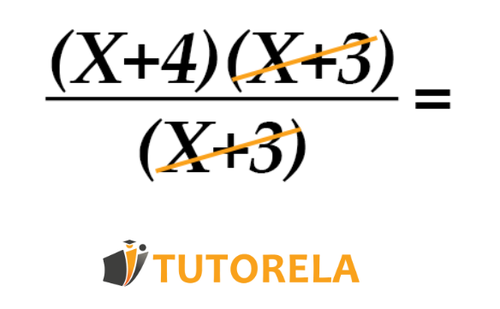Algebraic fractions are fractions with variables.
Factoring Algebraic Fractions
Ways to factor algebraic fractions:
- We will find the most appropriate common factor to extract.
- If we do not see a common factor that we can extract, we will move on to factorization with formulas for abbreviated multiplication as we have studied.
- If the formulas for abbreviated multiplication cannot be used, we will proceed to factorize with trinomials.
- We will reduce according to the rules of reduction (we can only reduce when there is multiplication between the terms unless they are within parentheses, in which case, we will consider them independent terms).
Test yourself on factorization and algebraic fractions!
Determine if the simplification below is correct:
\( \frac{3\cdot7}{7\cdot3}=0 \)
Observe, you can factorize every expression included in your fraction separately in any way you desire and, in the end, you will arrive at the factorized expression.
Let's see an example of factoring algebraic fractions:
As you can see, in this fraction only the numerator can be factored.
We will factor it and obtain:
Now, we can reduce in the following way and we will obtain:

Examples and exercises with solutions on factoring algebraic fractions
Exercise #1
Determine if the simplification below is correct:
Video Solution
Step-by-Step Solution
We will divide the fraction exercise into two different multiplication exercises.
As this is a multiplication exercise, you can use the substitution property:
Therefore, the simplification described is false.
Answer
Incorrect
Exercise #2
Determine if the simplification below is correct:
Video Solution
Step-by-Step Solution
We will divide the fraction exercise into two multiplication exercises:
We simplify:
Therefore, the described simplification is false.
Answer
Incorrect
Exercise #3
Determine if the simplification shown below is correct:
Video Solution
Step-by-Step Solution
Let's consider the fraction and break it down into two multiplication exercises:
We simplify:
Therefore, the described simplification is false.
Answer
Incorrect
Exercise #4
Determine if the simplification below is correct:
Video Solution
Step-by-Step Solution
Let's consider the fraction and break it down into two multiplication exercises:
We simplify:
Answer
Correct
Exercise #5
Determine if the simplification below is correct:
Video Solution
Step-by-Step Solution
We simplify the expression on the left side of the approximate equality:
therefore, the described simplification is correct.
Therefore, the correct answer is A.
Answer
Correct
Determine if the simplification below is correct:
\( \frac{4\cdot8}{4}=\frac{1}{8} \)
Determine if the simplification shown below is correct:
\( \frac{7}{7\cdot8}=8 \)
Determine if the simplification below is correct:
\( \frac{5\cdot8}{8\cdot3}=\frac{5}{3} \)
More Questions
Factorization and Algebraic Fractions
- Solve Complex Rational Equation: ((2x-1)²)/(x-2) + ((x-2)²)/(2x-1) = 4.5x
- Calculate A and B in the Equation: Solving \((\sqrt{x}-\sqrt{x+1})/(x+1)=1\)
- Solve the Equation: 1/(x-2)² + 1/(x-2) = 1 Step-by-Step
- Solve the Rational Equation: (x³+1)/(x-1)² = x+4
- Identify the Application Context of the Fraction x/16: Mathematical Analysis









